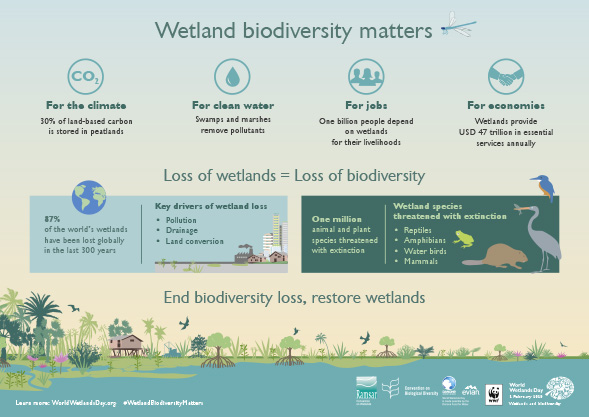Celebrate Biodiversity this World Wetlands Day!
By Carley Rennie.
Hiking through the Torrance Barrens you pull out your binoculars and spot a Coopers Hawk! Wetlands such as those found throughout the Torrance Barrens Conservation Area are a hub for biodiversity and provide a number of recreational activities for visitors to enjoy. Birding and hiking are just a couple of the recreational opportunities wetlands in Muskoka provide for the region.
February 2nd is World Wetlands Day (WWD) and the theme for 2020 is ‘Wetlands and Biodiversity’. WWD celebrates and brings awareness to the critical services that wetlands provide and the necessity to protect them. Globally, 40% of species live or breed in wetlands. There is no denying that wetlands are an integral part of the Earth’s systems and necessary to maintain healthy species populations.
Biodiversity is the variety of all living things that make up our natural world. From the smallest microorganisms to large animals to plants, all play a role in maintaining a balanced, healthy environment. Biodiversity is the backbone that supports the Earth’s dynamic systems and provides us with food, clean water and air, and much more.
As human populations grow and develop, we are impacting and eliminating important habitats and species across the globe, thus decreasing biological diversity worldwide. Up to one million species could be at risk of extinction due to climate change, land destruction and fragmentation, pollution, and invasive species.
Biodiversity spans the Earth and varies depending on climactic and physiographic characteristics. Wetlands are ecosystems that are distinguished by their saturated soils and uniquely adapted vegetation. Wetlands comprise around 6% of the Earth’s surface and 13% of Canada’s terrestrial area. While natural environments are declining at rapid rates; wetlands are disappearing three times faster than forests.
In Muskoka, over 10% of the landscape is covered by wetlands. Wetland biodiversity provides a number of ecosystem services for Muskoka some of which include recreation, flood control, water filtration, and nutrient cycling.
The biodiversity of wetlands also has a significant impact on local and global economies. In Ontario alone, the natural infrastructure wetlands provide amounts to $14 billion annually in economic benefits for the province. More locally in Muskoka, the economy relies on the health of its environment as a main attraction for visitors and business. Wetlands support the health of the watershed by filtering and maintaining water quality. Therefore protecting these ecosystems throughout the region is integral to sustaining the environment and economy.
Protecting, managing, and restoring wetlands is important to sustain biological diversity. Wetland biodiversity supports economies, controls floods, filters pollutants, stores carbon, and reduces the impacts of climate change. To learn more about World Wetlands Day and the importance of wetland biodiversity visit www.worldwetlandsday.org. Learn more about wetlands in Muskoka on the Muskoka Watershed Council website at www.muskokawatershed.org or hike the Muskoka Conservancy’s wetland trail in the Upjohn Nature Reserve in Bracebridge.

